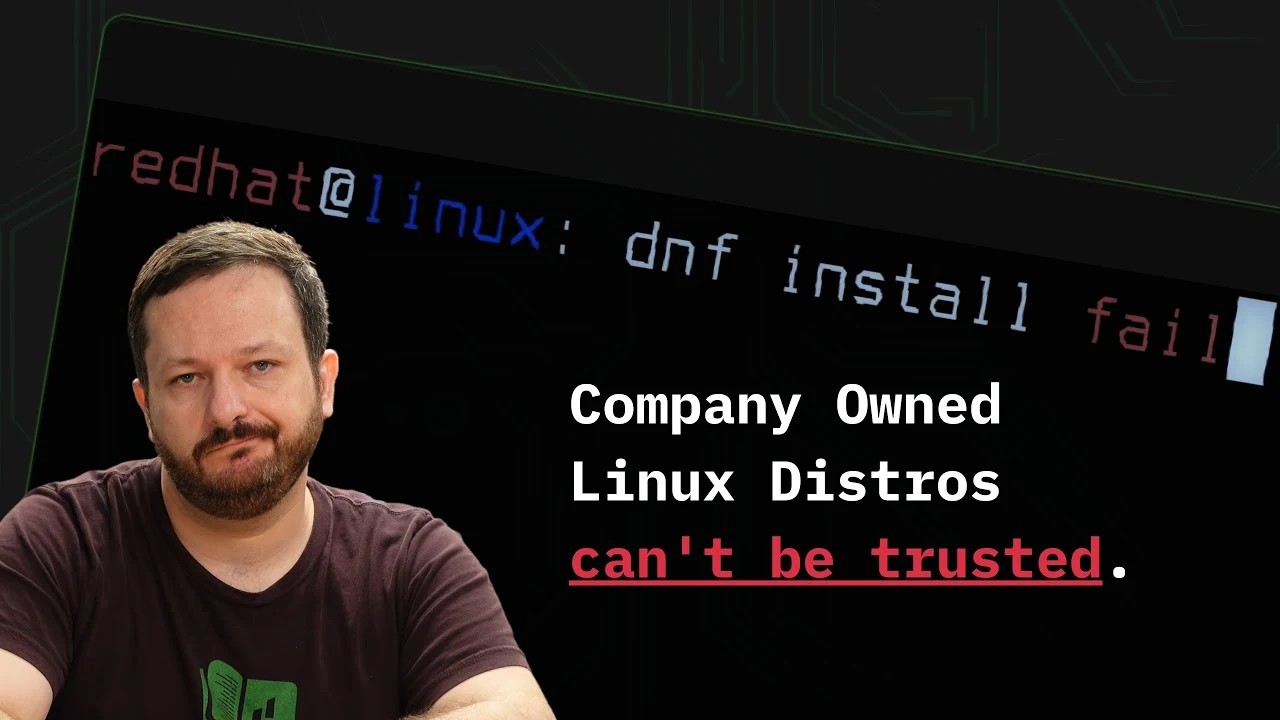When it comes to Linux Distros, each are either managed by their community or by a company. With recent news, it becomes clearer than ever that those managed…
I’m pretty happy with my Tumbleweed installation, and I don’t think I’ll be leaving anytime soon.
Right? Like it or not, we live in a society dominated by money. A very small number of Linux distributions have found a way to sustainably produce an excellent product. That’s a good thing. The alternatives are either burnout or insecurity.
And let’s not forget that a lot of contributions to Linux have come from Red Hat and other companies.
@wave_walnut Thanks, the recap was important to understand what happened so far. As it seems, the writing was on the wall. Now I understand why so many was against Red Hat, similar to how they were against Canonical (but for other reasons).
I don’t get the Canonical hate. They are innovative and have contributed a lot to the Linux community. Also, Linux is their focus. Without companies like them, development would be a lot slower.
deleted by creator
Someone’s favorite distro got criticized, damn.
deleted by creator
That’s not even accurate. You really need to get a grip, or at least learn what makes a desktop environment separate from the OS in unix-based OSs.
deleted by creator
French police: we saved millions of euros by adopting Ubuntu
Glad to see that you agree with the french police, Tenet.
@exohuman It’s not hating everything, but criticizing certain aspects they did in the past or they do now. I don’t know how long you are using Linux, but I did start with Ubuntu in 2008 and used it exclusively for 13 years (approx.). Just because a company was good in the beginning does not mean it is now too.
Examples why is listed in the above linked video. In the past, Canonical was criticized for not working on Wayland and instead creating their own alternative that is MIR. Due to the popularity of Ubuntu, that would make things in the Linux world complicated as MIR and Wayland need to be developed and supported. Instead using GNOME or any other existing desktop environment, they started their own. While I found that perfectly okay, in the beginning it looked like focus on tablets and was not good in the beginning (I actually liked Unity desktop environment later).
Now they are pushing Snaps, which will create another eco system that besides Flatpak. And it is mostly just for Ubuntu. Snaps were bad in the beginning, so it got a bad image from the start. That’s not all. The servers for Snaps is proprietary. And you can’t just add another source to Snaps, like you can do with Flatpaks. Meaning if you have your own server with Snaps delivery, you need to opt out of Snapcraft .io servers from Canonical. Do you want know more? One of the reasons I left Ubuntu was that Snaps are spamming the loop devices (most don’t care). Then there is this clunky PPA system, which has some problems too (and why Canonical ties to switch to Snap instead).
What else do we have? Ah yes. Do you know about the Amazon incident? Ubuntu had spyware built-into their search functionality, where Amazon would get search queries without the consent of the users.
And not all, there was plans to drop support for 32 bit libraries, which would make gaming with Steam really bad. Obviously this is not something everyone cares, but that was an important reason for many not to use Ubuntu anymore. Because of the uncertainty.
I am not suggesting that everything is bad! Just listing a few things why the community started to dislike Ubuntu. Also nowadays nothing innovative comes from Ubuntu; it’s stale, it’s boring. Which is fine if you like that, but that is not innovative or leading anymore. The landscape of alternatives changed. I personally don’t hate Canonical or Ubuntu. I stopped using it for several other reasons too, not just because of the listed problems. Some exaggerate and start hating in the internet.
And not all, there was plans to drop support for 32 bit libraries, which would make gaming with Steam really bad. Obviously this is not something everyone cares, but that was an important reason for many not to use Ubuntu anymore. Because of the uncertainty.
This contributed to Valve switching SteamOS to Arch.
@falsem I remember. But at that time, Steam OS 2 was already based on Debian and not Ubuntu anymore. Steam OS 1 was based on Ubuntu if I remember correctly. Therefore what Ubuntu does wouldn’t affect Valve anyway. So I don’t know how much this played a role in switching to Arch. So the timing might be just coincidence.
@thingsiplay What do you use now instead of Ubuntu?
@bmanhero Hey. 2 years ago I switched to Manjaro. Used it 1 and half a year and wasn’t happy with it anymore, as it has its own problems and controversy, which I’m not getting into here. And half a year ago I switched to EndeavourOS, which is more closely based on Archlinux. It’s very quiet different from Ubuntu with its rolling release model and community driven development of Archlinux and EndeavourOS. This was the main reason for me to use it, as I wanted to have the newest version of software that is available, plus the fantastic AUR.
I’m a bit more advanced nowadays and can handle that. Would not recommend it as a drop in replacement for Ubuntu; there are way more similar distributions.
This is a pretty good summary of their shennannigans: https://www.gnu.org/philosophy/ubuntu-spyware.en.html
In the past, I’ve got upvotes for dissing Canonical. The funny thing is that I’d get downvotes instead if I replace Canonical with Ubuntu.
It makes sense, people who know what Canonical is are a smaller demographic.
@bedrooms That’s interesting. Maybe it’s a psychological effect to think of a company making money when reading about Canonical, and in contrast to think about Linux and community and the actual software when reading about Ubuntu. Just throwing out my thoughts, not sure if that is a thing.
Thank you. Same as you, I get a little more why RedHat and Canonical are criticized by peoples from his explanation.
What the fuck is happening with RedHat? Can someone explainlikeimfive?
@nostalgicgamerz Watch the video.
Developers of distributions that are similar to CentOS will have to pay a subscription to RedHat to access the open source code. This will lead to worse distros and uncertainty that could force users to switch to RedHats paid distro. It is legal, but a shitty move and against the idea of open source movement because it makes using others code for your own projects more difficult, and worsens collaboration.
I’m confused on how this is legal? Isn’t Linux based on a license that prevents them from doing that? I was under the understanding that was how CentOS came into being in the first place.
It’s not the Linux kernel that’s being closed, but likely their own contributions, which most likely aren’t all GPL.
And that is dumb. Companies with any sense will veer to debian and distros that are going to be open with their own contributions because gasp - you can write code, put it out under gpl v2 or a permissive license and make money on the support contracts like they were doing.
Do you remember that football daddy bought to play with friends? Yea it was a nice ball right? Do you remember how everybody signed it during the years and it became a more valued ball because of that? Well the neighbours kid also wants a ball like that, but that fuking siko is getting none because the idea was from daddy and daddy does not want you or anybody to play with it and now daddy wants money if you even have the audacity to think about writing on a football.
RedHat is only going to provide source code to their paying customers. This is legally compliant with the GPL. This has made a lot of people mad because there are a lot of distros that are essentially copy/pasted Redhat code that people use.










